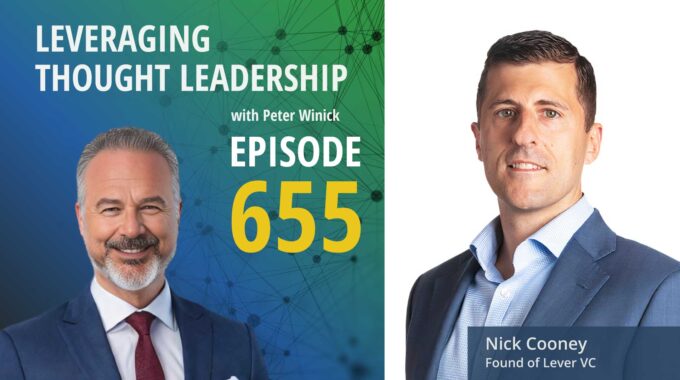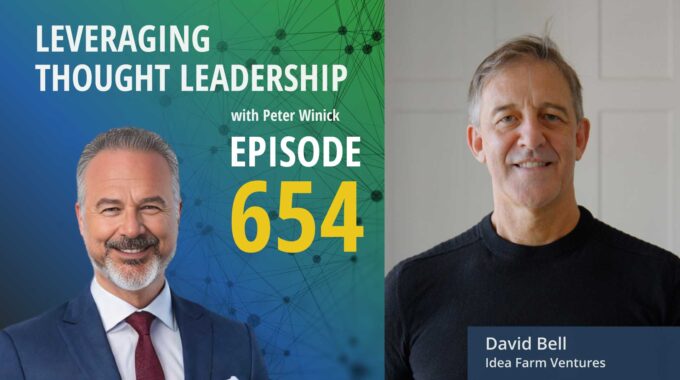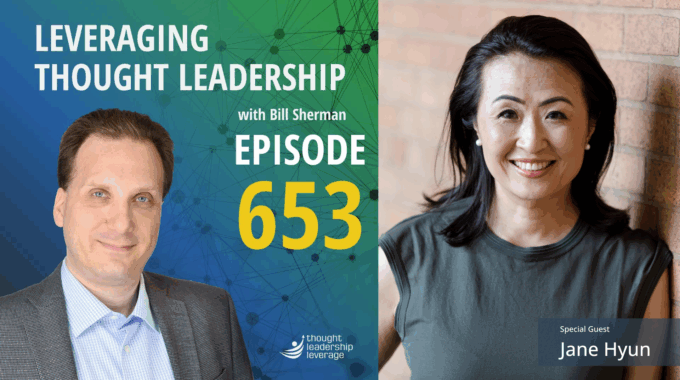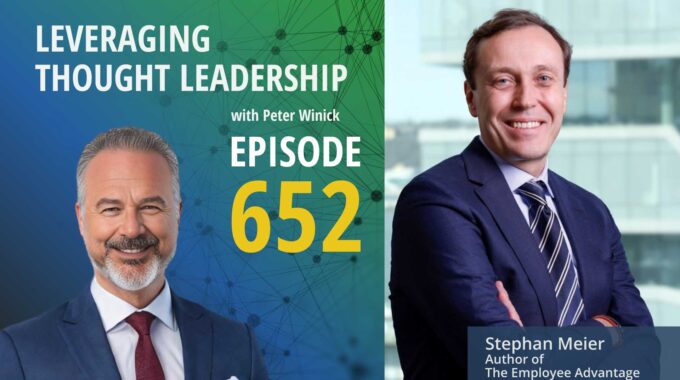How Strategic Content Fuels Growth in Purpose-Led Ventures This episode explores how thought leadership can…
The Path of Developing a Book into a Business Model. | AJ Jacobs & Rita Gunther McGrath
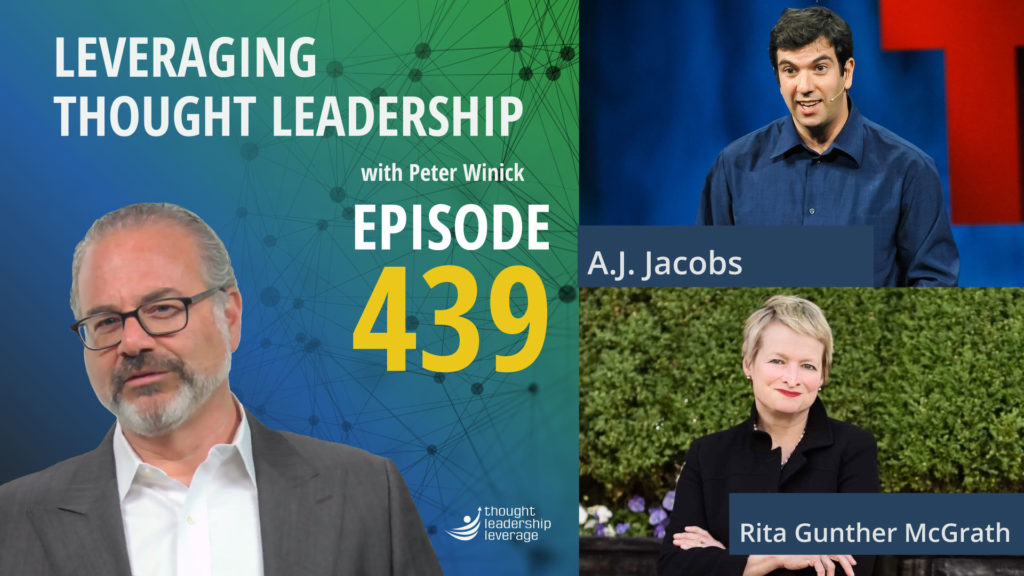
Publishing, marketing, and building a business from a book.
An interview with AJ Jacobs & Rita Gunther McGrath about their experiences from book to business.
Many professionals realize that a published book is a great business card – but is anyone actually reading it?
Does your book have an impact?
Today, we discuss the journey of publishing, marketing, and building a full business model from a book. To share their insights on that topic, we’ve invited two great guests that have the publishing process down pat.
Rita Gunther McGrath is a highly regarded speaker, professor at Columbia Business School, and the author of multiple best-selling books such as Seeing Around Corners: How to Spot Inflection Points in Business Before They Happen.
A.J. Jacobs is a journalist, TED Speaker, and seven-time author including the best-selling book Thanks a Thousand: A Gratitude Journey.
Our conversation starts by discussing the business side of publishing. Our best-selling authors clarify the focus of their recent work, and discuss the various purposes that a published book can serve. While creating a “book-sized” calling card will put you ahead of some, your content still needs to be more than a glorified article if you want people to read it and take action based on your insights.
Many first-time authors believe that once the book is written, the job of marketing will fall to the publisher. That’s no longer the truth! Nowadays, publishers have stepped back from marketing – leaving the author to get the word out themselves. Rita shares how she plans the marketing of a book before any real writing even begins, while A.J. seeks innovative and creative ways to slice the topics of his books into as many sectors as possible, in order to earn a larger audience.
The final leg of our conversation involves taking the information from the page and turning it into teachable content. Our guests share their strategies for turning thought leadership insights into lessons, creating systems and capabilities for instruction that can be brought into an organization in order to create measurable impact.
Three Key Takeaways:
- When writing a book, ensure your content is bigger than a simple article could contain.
- Consider the method of publishing and marketing for your book before you start writing.
- Publishers no longer promote books. As the author, you’ll need to build a platform to reach the audience by yourself.
If you need a strategy to bring your thought leadership to market, Thought Leadership Leverage can assist you! Contact us for more information. In addition, we can help you implement marketing, research, and sales. Let us help you so you can devote yourself to what you do best.
Transcript
Peter Winick A welcome. Welcome. This is Peter Winick. I’m the founder and CEO of Thought Leadership Leverage. And you’re joining us on the LinkedIn Live version of our podcast, which is Leveraging Thought Leadership. And today is going to be a blast, because we’ve got two really amazing, unique and interesting people. So we’ve got AJ Jacobs and Rita McGrath and normally I sort of blow through the bios, but today I’m not going to do that. I’m going to give you the full bios on these two because they’re really, really interesting and I think we’re going have a fun conversation.
Peter Winick So really, Rita McGrath is a bestselling author, a sought after speaker and a longtime professor at Columbia Business School. She’s widely recognized as a premier expert on leading innovation growth during times of uncertainty. If anyone’s there in times of uncertainty, she’s received the number one achievement award for strategy from the prestigious Thinkers 50 and has been consistently named to one of the world’s top ten management thinkers in its bi annual rankings. And then we skipped some of the other stuff of multiple author, etc..
Peter Winick AJ, who some of you may know, is an author, journalist, lecturer and human guinea pig. He’s written four New York Times bestsellers that combine memoir, science, humor and a dash of self-help. He’s an editor at large at Esquire, a commentator at NPR and a columnist at Mentalfloss. His books just on the topics of his book are amazing. Anyway, welcome to both of you. Thank you for spending some time with us today.
Rita Gunther McGrath Pleasure to be here.
AJ Jacobs Thank you.
Peter Winick All right. So let’s start with you, Rita, tell us just a little bit about your path, your journey as a thought leader and what you tend to focus on.
Rita Gunther McGrath Well, I work on the intersection between strategy and innovation with flashes of entrepreneurship thrown in. I started out my career actually as a public servant. I wanted to be in politics and ended up as a cog in the bureaucratic machine. Eventually decided to, in a way from that, went back to get my Ph.D. landed at Columbia Business School. And that’s really been a professional path in terms of the work. It’s all really around the subject of leading and managing under uncertainty, which is the focus of my work on innovation in particular data.
Peter Winick So, AJ tell us a little bit about your work and your path and your nontraditional deep dive into things that you master?
AJ Jacobs Yeah, I my nonfiction writer and I love to do things and try to learn lessons from them and share those lessons so they could be on anything in my life that needs improvement, which is everything. So I did one about following all the rules of the Bible. Is there anything to learn from that on how not to gossip? And I did one recently on Gratitude, where I thank the thousand people who had anything to do with my morning cup of coffee. And that was a real lesson in gratitude. And I did one actually on George Washington’s rules of life. So that lived by those for a while. So that that that was some leadership right there.
Peter Winick Yeah. Yeah, I would think. Cool. So you’ve both taken obviously very different paths, but you’re both at, what I would say, sort of the top of your respective games. And we were chatting a little bit before, before we went live about, you know, obviously one thing I always ask authors is, well, what’s the next book? Because they can always answer that question whether it’s actually has a pub date or it’s still residing in their brain. Tell us a little bit about your experiences on the business side of publishing. So what are the things that you’re looking at now? Because it’s changed, right? It used to be, you know, your job is to come up with a unique idea and both of you do or have the domain expertise or whatever. But maybe, maybe touch a little bit to start with you will have different publishing is and what to expect or not expect from a publisher these days.
Rita Gunther McGrath Sure. So I think publishing, at least in the business world that I that I work in, has become kind of overwhelmed with books. So people have now understood that a book is like a big business card. If you don’t have a book, you’re not even in the game. So that creates enormous pressure to produce a lot of books that frankly, many are really just articles with a bunch of anecdotes thrown in. So I think that’s one reality. I think there’s an overwhelming amount of books. And the question is really, is anybody actually reading them or the ideas actually have an impact? So that’s a big question mark. I think to the extent they ever did, publishers have really stepped back from any role in promoting them other than they include them on a brochure, maybe. Or maybe they’ll ask you publicity or something, but you’re really on your own as far as spreading the word once the book is written and a lot of people are new to that world of writing, once you’re done with a book in print or whatever the equivalent is these days, you’re done. And that’s just the beginning.
Peter Winick Yeah. So I want to push on something you said there or maybe unpack is that you said, you know, there are a lot of books out there that could have been an article and it used to be back in the Stone Age not that long ago, where oftentimes it would be an article that became a book. Right. There was a maybe a great article in HPR or wherever, wherever it appeared. And somebody, you know, and it took off for whatever reason or just got certain folks to be intrigued. You know what you should spend instead of spending a month or two on an article, maybe you should spend six months on a book. There’s something here and that, you know, that’s a whole different psychology, if you will, then yeah, I read this book and it was 240 pages. But you know what? Give me the TED Talk or, you know, I, I don’t really care about the money, but I didn’t need 6 hours of my life for that. And I think that’s really kind of the rub now. AJ, what would you what would you say about that? So you can spend a year you know, one of your books was a year living biblically. I guess you could have run the shorter version of my lunch writing a book.
AJ Jacobs Right? Yeah. I would agree with Rita that it all depends on why you’re writing or reading that book. So, like she said, some are calling cards, some are ways. Some of my friends use them as ways to get speaking gigs or media appearance. My voice I actually are partly for the speaking, but mostly I want people to actually buy and read or listen to them. So in that case, for me, my strategy is to go big to take on the biggest topics in life. They not be reduced to an article. So my book on Gratitude was about how the entire world, where it took thousands of people to make a simple cup of coffee because you needed the farmer and they were the distributor. And so it was all you know, it was a global project. And same with my year of living biblically was all about every part of my life was affected like the way I talked and thought and dressed and my how on my face look, I have a huge beard. So that’s my my solution is to go big.
Peter Winick Yeah. Interesting. Interesting. And then I think I want to pick up where you left off. Rita, is the burden, the role, the function of marketing and making the books a success is really falls on the author. And I think that’s a good thing and a bad thing, right? Because there’s only a brief moment, a brief window in time where there’s actual alignment between the author and the publisher. And I think that’s really the gist of the struggle. Right? Like the publisher only makes money. Number of units sold. Some profit margins for book. An author. You know, in the grand scheme of that year of their lives, the royalty side, whatever the economic piece directly derived from the book is probably not life changing, and the book serves as a piece of a larger puzzle. So talk about sort of the your experience marketing and what you do differently now than you might have when you were marketing your books years ago.
Rita Gunther McGrath Well, my first book, I made All the Mistakes First Time Authors make, which is you forget that you have many books in your life. And so I tried to stuff everything into it. So it’s 400 pages long. And as with many newbie authors, I assume the publisher would do a lot more than they ended up doing. And so today I really think about how the book’s going to be positioned in marketing before I even begin a serious writing effort.
Peter Winick Or work backwards.
Rita Gunther McGrath Yeah, yeah. And for me, I think I do try to take on big topics now. They’re not as broad an audience as you would have. Your books really appeal more to any person to read your book and get something out of it. With me, it’s much more of a business audience, probably more executive audience. But I also like to take on topics that I think are interesting. And for me, the writing process and the research process teaches me so much and it’s a really great way of staying at the cutting edge. And, you know, I’m a strategist that changes every minute. So you really have to be on top of your game. If you’re going to be.
Peter Winick If you’re enjoying this episode of Leveraging Thought Leadership, please make sure to subscribe. If you’d like to help spread the word about our podcast, please leave us a review and share it with your friends. We’re available on Apple Podcasts and on all major listing apps as well as at ThoughtLeadershipLeverage.com/podcasts.
Peter Winick Yeah. So it seems it makes you a better strategist, right, by forcing you to see different things and experience different things and do that. So you’re constantly sharpening your tools, if you will. What would you say? AJ, any thoughts on that.
AJ Jacobs In terms of marketing? Sure. It changes all the time. The influencer is holding up a book on Instagram, according to my publisher, as an agent is now as powerful as NPR’s. But, you know, if it’s a super famous person, not just like a low level influencer, I would say, though, I still do many of the things I used to do. One is just trying to slice my book into as many different sectors as possible. So, for instance, with the book about the Bible, I know, of course, I’m going to try to appeal to mainstream USA Today types, but also religious publications. But also the Bible has sex advice and the Song of Solomon is all about sex. So I pitched Glamour magazine on sex tips from the Bible. So to me, that is that is a key for every book I do. I try to.
Peter Winick So stay there for a minute because I think whether Glamour took that or not, the creativity is really interesting, right? You say, oh, Glamour. You know, he’s on the cover of Glamour is top ten. You know whatever spice up this. I never would have thought, you know, a year immersed in biblical work would have been pitched to glamor. But I love because it’s a wide spread audience, whatever the creativity that you put in isn’t just in the writing, but how do I connect the dots to connect it to people that might not otherwise be looking for a book? Because there probably wasn’t a big market for people looking to read books on or about a guy that spent a year living biblically. But you had to sort of bring it to them and read, this world, there is a market for C-level decks, CEOs, senior business leaders, etc. that are constantly looking to take on that information. So I think it’s I don’t know if one’s harder than the other. They’re different. Right. So we do I think your world is because your more traditional nonfiction business writer that stays focused in your lane. You know who your people are, you know what their struggles are. So you’re now probably more thinking around what’s keeping them up at night. So your last book, which was I may screw Up the title of is Thinking Around Corners was at it did I get it right?
Rita Gunther McGrath Thinking Around Corners, um hmm.
Peter Winick Was really amazing and timely even though when you wrote it COVID wasn’t a thing, but it accelerated the need for senior leaders to strategically think around the corner, which used to be sort of this luxury maybe that can be done on a Saturday morning. But when everything was changing so rapidly about every element of Marvel’s everyone’s business, that became a break glass in case of emergency. So did you experience sort of the things beyond your control, making it more relevant or timely or in demand?
AJ Jacobs Oh, absolutely. Absolutely. You know, for once, I timed a book perfectly. And, you know, I wish I could tell you this was a grand strategic plan. It wasn’t. But again, I.
Peter Winick Think it.
Rita Gunther McGrath Came out right at the end of 2019. And yes, I mean, the demand has been incredible. And I think the nature of what I’m doing is changed. So my talks very often would be, oh, you know, give us the high level overview, do a little bit of entertainment, you know, make it more approachable. And that was all great. And I would say probably 60% of what I’m doing these days is how am I supposed to think about this? What’s our next step? How to help frame it for me, how do I learn faster? It’s really much more how do I actually do this? Which I think is kind of a changing nature of what people are looking for from an engagement.
Peter Winick Yeah, I want to get back to that. I mean, age of something on that.
AJ Jacobs Well, I would say yeah. I mean, timing is certainly partly luck. My next book is about puzzles and it’s I chose it before the pandemic. And now puzzle and word on jigsaw is are everywhere. Yeah. Part of it is just looking around and seeing what is on the horizon and what is coming up.
Peter Winick Which isn’t easy to predict. And I think it’s also being open minded enough to realize how do I connect to something that’s happening in the universe right now that’s beyond my control that we’re all experiencing? That’s relevant. I want to go back to a point that Rita made, which I think is critical in this sort of are we post COVID yet or on wherever we are now with whatever we do? The difference between a thought leader as an agitator like, hey, let me bring you into the keynote, basically, give me your book summary, tell me something interesting, and then we’re going to go to the cocktail party and we’ll chat about that for a bit. Or I can tell my friends when I got back that I saw reader AJ speak and there’s a lovely two organizations going, Yeah, we get this digital stuff is a great way to consume content. It’s kind of lousy for connection and community, but they’re looking more and more. We’re starting to see the market change to go to thought leaders, to develop capability, to develop the skills, to develop the insight instead of the just the storytelling piece. How are you how are you reacting and responding to that from an operating your business perspective?
Rita Gunther McGrath Do we do overs? Yeah, yeah, yeah. So two things I absolutely agree with you. And what I’ve created is a sister company to my sort of speaking company, it’s called, and we do three things basically. So there’s some advisory so that you come into your organization and give you some guidance. The second thing is a software spine that you can think of as a structure for organizing your innovation efforts. It’s not like a software product like Slack or something, but it’s a spine bullet. And the third piece is very relevant, which is short online learning modules, which you can take at work in real time. And the question I’m increasingly asking people is, okay, so you’ve got 6 to 8 hours. You want to sit down with a book or you want to keep that same exact amount of time, get through one of my learning modules and guess what? You’re going to do stuff with it after you’ve done that. And which are you going to spend your time on? And I suspect we’re going to start to see much more demand for thought leadership not only expressing itself between printed pages, but actually translating into capability, building things. And it’s so easy to create a short online course these days. And I know that’s going to be a big wave of the future.
Peter Winick When I think the reality is that I don’t care how good of a speaker anyone is. You typically don’t change behaviors in an organization that lead to results and outcome is just not realistic. But if I can get a bunch of people individually to go through some four, six, eight hour journey and develop those capabilities, that’s different. And I think it’s interesting in that, you know, a lot of times you read a book and it says, oh, and go do this and go write this down like nobody’s doing that. Let me get your thoughts on that, if we could.
AJ Jacobs I think it’s a great point. And the more interactive, the better. So, for instance, with my book on Gratitude, I got a lot of schools who would assign their students. They didn’t do coffee because as kids, those kids drink coffee. But could it be books? It could be games, it could be anything. And they had to go around and thank ten people who made it possible for the kid.
Peter Winick To sing saying, I can’t make sure I understand. So you went 3000 people to get you your cup of coffee, run the kids something.
AJ Jacobs Who had to pick something? That was my book. Read my book. And then they had to do their own project based on my book. And then I would come speak to them and hear about their experience and relay my experience. And I found it lovely. And like you say, it’s a much better way to learn and learn by doing as they.
Peter Winick Learned how to be a journalist, how to ask questions, how to be, you know, maybe people might come back at you and not like it, but you might have started a whole wave of new consultants coming out more, said one consultant to the others. So they learned some skills. It wasn’t just that they figured out lots of people touch their Snickers bar or their juice box or whatever. Yeah, but it doesn’t just magically appear in the fridge, right?
AJ Jacobs Yeah, yeah, that’s a good point.
Peter Winick And I think that that’s a great challenge for thought leaders to say today is to say, okay, well, how can I break this down to the molecular level, the teachable level, so that others can develop the capabilities? And I think what people sometimes get stuck with that is saying, well, I’ll never be read or read who’s been doing this for quite some time and just got to get it out and we’re saying, No, no, no, you don’t compare that to that. That’s not fair. Your baseline is here. We could take you up. We might be here. It doesn’t really matter. As long as I can improve your baseline and get you to see, believe, act, behave differently. That’s an outcome. And I think it’s a way the thought leaders need to sell their solutions today. Very cool play. You’re both sort of doing that. I love the school exam. You’ve got some amazing examples.
AJ Jacobs Though.
Peter Winick Maybe if you could each share as we start to wrap down in a little bit here. One thing that you’ve you know, you’re really proud that you’ve done well over the years. And one thing that maybe you might wish you had done differently. You want to start, AJ?
AJ Jacobs Sure. I would say I, I try to spend 15 minutes every day just brainstorming ideas. And so I do come up with a lot of ideas. 98% of them are pretty terrible. And I’m okay with that because I do believe it’s a numbers game and hopefully that 2% will turn into an article, a book, a post, anything. So I’m a I do think I’m good at generating ideas. Not all of them are great, but some of them hopefully are worth for community.
Peter Winick And typically generating 50 minutes as a one is a ten is it depends on the day is it.
AJ Jacobs At least. I mean, they could be tiny, tiny ideas like, you know what if I made a snowman with a vape instead of a pipe? Like, that’s the idea. Or they could be like, my next book should be about epistemology, the quest for truth. So they could be small, are big. But I come away on 2015 a day smaller, vivid, and something I could do better. I well, I think I need to be to adapt a little more to because I, you know, I, I saw I was one of the first people to join Twitter and I was like, I’m too exhausted. Like a real job. And I never really followed it up. So I’ve got to be a little more fast on my feet. Activity.
Peter Winick Got it. Rita?
Rita Gunther McGrath Well, something I’m proud of looking back, is my work on discovery and planning really went into what became a lean startup and standard curriculum and a lot of entrepreneurship classes. And I think it has been a force for good, positive change. You know, things I could have done better. I mean, there’s legions that I’ll pick on a recent painful example. So I started this company, Valise, which you can learn about is dot com. It’s five years now and we’re just really getting our feet under us. I’ve been to three tech stacks. I’ve been through four different management teams. And, you know, you look back and you ask yourself, Well, is that just the tuition I had to pay to get where I am right now? But certainly it would have been less painful to get there more directly.
Peter Winick Well, yeah. And it always takes more time, more effort, more money and one bad hire and all that. Well, this has been phenomenal. I appreciate both of your but longtime listener first time caller. I love both of your bodies of work separately. And I was thinking about, you know, let’s put two people on that probably usually aren’t on the same panel. And this has been this has been a lot of fun. And I hope you enjoyed yourself. I learned something along the way as well.
Rita Gunther McGrath It’s great to meet you, AJ. I’m impressed at your discipline. I mean, a whole year biblically. Well, I do.
AJ Jacobs But the key is to announce it publicly. So I couldn’t back out.
Peter Winick And then you’re a coward, right? Right before. Going to announce anything else publicly again?
AJ Jacobs Well, I already announced my puzzle book, so that right for now. But yeah, this was great. I really enjoyed learning and I can’t wait to dive in to Rita’s work and listen more to you, Peter.
Peter Winick It would be fun to see you two collaborate on something. I don’t know what that, but really interesting.
Rita Gunther McGrath Interesting thing is, right? Yeah.
Peter Winick To learn more about Thought Leadership Leverage, please visit our website at ThoughtLeadershipLeverage.com to reach me directly. Feel free to email me at Peter at ThoughtLeadershipLeverage.com and please subscribe to Leveraging Thought Leadership on iTunes or your favorite podcast app to get your weekly episode automatically.



